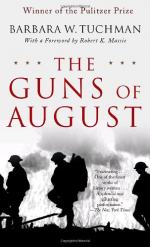
|
| Name: _________________________ | Period: ___________________ |
This test consists of 5 multiple choice questions, 5 short answer questions, and 10 short essay questions.
Multiple Choice Questions
1. What humiliation in their past did the French want to avenge?
(a) Their defeat at Waterloo.
(b) Their defeat at Hastings.
(c) Their defeat at Sedan.
(d) Their defeat at sea by the Germans.
2. What did Kaiser William II mean when he said, “If only someone had told me beforehand that England would take up arms against us!” (120)?
(a) That he saw England as an extension of the Russian war effort.
(b) That he never even considered the possibility.
(c) That the Germans did not think England would join France in the war.
(d) That the English lied to him.
3. What country was Bethmann referring to when he said, “it was like striking a man from behind while he was fighting for his life against two assailants” (129)
(a) France.
(b) England.
(c) Belgium.
(d) Germany.
4. Why did German deputies not know that the Belgians had rejected their ultimatum?
(a) Because it had not been sent yet.
(b) Because they did not read the newspapers.
(c) Because they did not care about it.
(d) Because the German leadership did not publish the response.
5. Which of these was not one of the three military minds that thought the war would last years, not months?
(a) Kitchener.
(b) Churchill.
(c) Joffre.
(d) Moltke.
Short Answer Questions
1. What instrument was played at King Edward VII’s funeral?
2. How many German trains were “each exquisitely scheduled to click over specified tracks at specified intervals of ten minutes” (79)
3. Schlieffen’s plan was derived from what ancient general at what ancient battle?
4. Were the French unaware of the possibility of an attack from the German right wing?
5. How long did Russian pessimists think the war would last, causing them to be labeled “defeatists”? (119)
Short Essay Questions
1. How did Belgium, and King Albert, finally decide to respond to the ultimatum from Germany?
2. Why did Britain and France create joint military plans in 1905 after Russia was defeated by the Japanese on the other side of the world?
3. Why, right up until the invasion actually happened, did many still believe that the German armies would not actually invade Belgium?
4. What other country besides Germany planned to use the open frontier of Belgium as a route of invasion, however this time only after the Germans had violated Belgian neutrality? How did they plan to do this?
5. What was the day called Der Tag?
6. What kind of things did King Albert of Belgium hear when he visited Berlin in Chapter 8?
7. How does the breakdown of German corps on their left, center, and right at the end of Chapter 2 (26) give the appearance of a sweeping hammer blow?
8. While the Germans had defeated the French in the Franco-Prussian war that ended in 1870, what condition was France in when World War I began just over 40 years later?
9. Who was appointed the new generalissimo of the French armies and what branch of the French military did he come from?
10. What ultimatum did Germany send to Brussels?
|
This section contains 822 words (approx. 3 pages at 300 words per page) |

|




